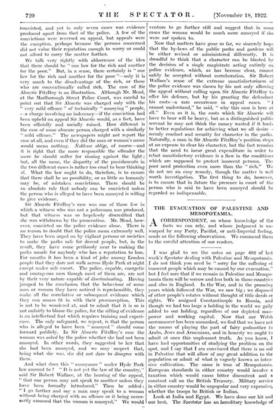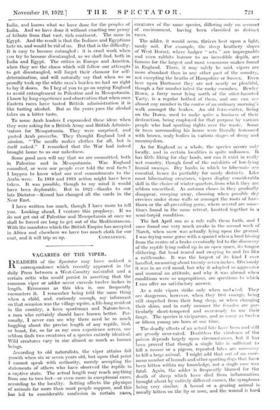THE EVACUATION OF PALESTINE AND MESOPOTAMIA.
ACORRESPONDENT, on whose knowledge of the facts we can rely, and whose judgment is un- warped by any Party, Pacifist, or anti-Imperial feeling, sends us the following observations. We commend them to the careful attention of our readers.
I was glad to see the notes on page 682 of last week's Spectator dealing with Palestine and Mesopotamia. I do not think you need be " sorry for the suffering of innocent people which may be caused by our evacuation," but I feel sure that if we remain in Palestine and Mesopo- tamia there will be sorrow and loss both in those countries and also in England. In the War, and in the prancing years which followed the War, we saw big ; we disposed of other people's estates without thought of title deeds or rights. We assigned Constantinople to Russia, and though we had too large a holding in the world we gaily added to our holding, regardless of our depleted man- power and working capital. Now that our Welsh necromancer has been unmasked, we find that we have not the means of playing the part of fairy godmother to Arabs, Jews and Armenians, and in honesty we ought to admit at once thiS unpleasant truth. As you know, I have had opportunities of studying the problem on the spot, and I say that I am convinced that there is no soil in Palestine that will allow of any great addition to the population or admit of what is vaguely known as inter. sive cultivation. The same is true of Mesopotamia. European standards in either country would involve a taxation which would cause bitter discontent and a constant call on the British Treasury. Military service in either country would be unpopular and very expensive, whether the troops be British or Indian.
Look at India and Egypt. We have done our bit and our best. The Sveetator has an hereditary knowledge of India, and knows what we have done for the peoples of India.. And we have done it without exacting one penny of tribute from that vast, rich continent. The same in gypt. And the result is that the Indians, and Egyptians hate us, and would be rid of us. But that is the difficulty. It is easy to become entangled : it is cruel work when you try to become disentangled, as we shall find, both in India and Egypt. The critics in Europe and America, when they see the chaos which will follow our attempts to get disentangled, will forget their clamour for self- determination, and will naturally say that when we so proudly took up the white man's burden we had no right to lay it down. So I beg of you to go on urging England to avoid entanglement in Palestine and in Mesopotamia. I know by long experience and observation that when once Eastern races have tasted British administration it is like tasting alcohol. But as the years pass the alcohol takes on a bitter taste.
To some Arab leaders I expounded these ideas when they were asking for a British Army and British Adminis- trators for Mesopotamia. They were surprised, and quoted Arab proverbs. They thought England had a mission. " The needle makes clothes for all, but is itself naked." I remarked that the War had indeed brought home to us our nakedness.
Some good men will say that we are committed, both in Palestine and in Mesopotamia.. Was England consulted, or were our people ever told the real facts ? I happen to know what our real commitments to the Arabs were. In 1918 and 1919 action might have been taken. It was possible, though to my mind it would have been deplorable. But in 1922—thanks to our late Dictator—Kemal has changed all the cards in the Near East.
I have written too much, though I have more to tell you. Looking ahead, I venture this prophecy. If we do not get out of Palestine and Mesopotamia. at once we shall be forced ere long to get out of the Mediterranean. With the mandates which the British Empire has accepted in Africa and elsewhere we have too much cloth for our







































 Previous page
Previous page